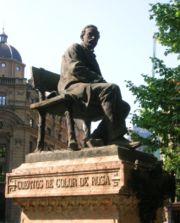
Antonio de Trueba
Encyclopedia

Spain
Spain , officially the Kingdom of Spain languages]] under the European Charter for Regional or Minority Languages. In each of these, Spain's official name is as follows:;;;;;;), is a country and member state of the European Union located in southwestern Europe on the Iberian Peninsula...
poet
Poet
A poet is a person who writes poetry. A poet's work can be literal, meaning that his work is derived from a specific event, or metaphorical, meaning that his work can take on many meanings and forms. Poets have existed since antiquity, in nearly all languages, and have produced works that vary...
, novelist, and folklorist born at Montellana, Biscay
Biscay
Biscay is a province of Spain and a historical territory of the Basque Country, heir of the ancient Lord of Biscay. Its capital city is Bilbao...
, in 1821 (some sources say 1819), where he was privately educated.
In 1835 he went to Madrid
Madrid
Madrid is the capital and largest city of Spain. The population of the city is roughly 3.3 million and the entire population of the Madrid metropolitan area is calculated to be 6.271 million. It is the third largest city in the European Union, after London and Berlin, and its metropolitan...
to learn business; but commerce
Commerce
While business refers to the value-creating activities of an organization for profit, commerce means the whole system of an economy that constitutes an environment for business. The system includes legal, economic, political, social, cultural, and technological systems that are in operation in any...
was not to his taste, and, after a long apprenticeship, he turned to journalism, hoping to make a livelihood by literary pursuits. To earn his daily bread he discharged the duties of a clerk in a small commercial house, but all the while he beguiled his leisure and his moments of regret by writing little poems and tales redolent of the yearnings and sympathies of a Basque
Basque people
The Basques as an ethnic group, primarily inhabit an area traditionally known as the Basque Country , a region that is located around the western end of the Pyrenees on the coast of the Bay of Biscay and straddles parts of north-central Spain and south-western France.The Basques are known in the...
transplanted to the busy cosmopolitan center.
Won over to him by the charm of his writings, Queen Isabella II
Isabella II of Spain
Isabella II was the only female monarch of Spain in modern times. She came to the throne as an infant, but her succession was disputed by the Carlists, who refused to recognise a female sovereign, leading to the Carlist Wars. After a troubled reign, she was deposed in the Glorious Revolution of...
made him historiographer of the Biscayan district, and he held this post until her flight in 1868. He was reinstated after the restoration.
In 1851 he hit the popular taste with El Cid Campeador and El Libro de los Cantares. His popularity was fixed by the appearance of his first collection of lyrics
Lyric poetry
Lyric poetry is a genre of poetry that expresses personal and emotional feelings. In the ancient world, lyric poems were those which were sung to the lyre. Lyric poems do not have to rhyme, and today do not need to be set to music or a beat...
, the Cantares (Madrid, 1852), and for the next eleven years he was absorbed by journalistic work, the best of his contributions being issued under the titles of Cuentos populares (1862), Cuentos de color de rosa (1864), and Cuentos campesinos (1865). Other collections of his tales, especially charming when they deal with his native region and its people, appeared in 1859, 1860, and 1866. The pleasant simplicity and idyllic sentimentalism of these collections delighted an uncritical public, and de Trueba met the demand by supplying a series of stories conceived in the same ingenious vein.
In his more ambitious attempts at writing a novel, as in his work dealing with El Cid
El Cid
Rodrigo Díaz de Vivar , known as El Cid Campeador , was a Castilian nobleman, military leader, and diplomat...
of history and legend, he failed signally; he was too conscientiously a recorder of the past and left his imagination no free play. He remains an amiable writer of second rank, but no one can read without sympathy and appreciation his pretty little songs fragrant with love for the landscape of his northern Spanish
Spain
Spain , officially the Kingdom of Spain languages]] under the European Charter for Regional or Minority Languages. In each of these, Spain's official name is as follows:;;;;;;), is a country and member state of the European Union located in southwestern Europe on the Iberian Peninsula...
home. He deserves serious notice among the earlier writers who helped to develop the novel of manners
Novel of manners
The novel of manners is a literary genre that deals with aspects of behavior, language, customs and values characteristic of a particular class of people in a specific historical context. The genre emerged during the final decades of the 18th century. The novel of manners often shows a conflict...
in the Spain of the 19th century.
He died at Bilbao
Bilbao
Bilbao ) is a Spanish municipality, capital of the province of Biscay, in the autonomous community of the Basque Country. With a population of 353,187 , it is the largest city of its autonomous community and the tenth largest in Spain...
.

